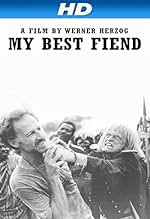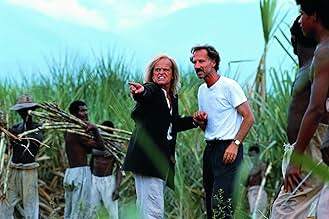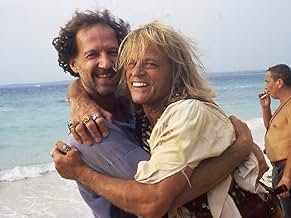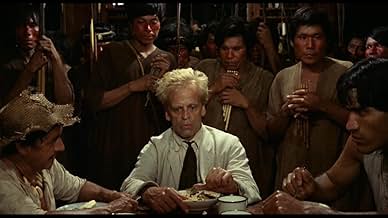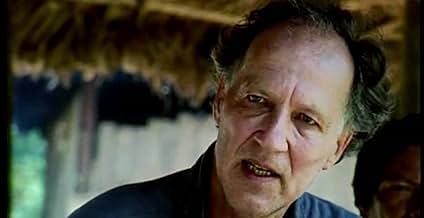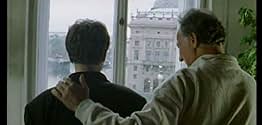IMDb RATING
7.8/10
13K
YOUR RATING
The love-hate relationship between Werner Herzog and Klaus Kinski, the deep trust between the director and the actor, and their independently and simultaneously hatched plans to murder one a... Read allThe love-hate relationship between Werner Herzog and Klaus Kinski, the deep trust between the director and the actor, and their independently and simultaneously hatched plans to murder one another.The love-hate relationship between Werner Herzog and Klaus Kinski, the deep trust between the director and the actor, and their independently and simultaneously hatched plans to murder one another.
- Awards
- 1 win & 2 nominations total
Klaus Kinski
- Self
- (archive footage)
Guillermo Ríos
- Self
- (archive footage)
Andrés Vicente
- Self
- (archive footage)
Paul Hittscher
- Self
- (archive footage)
Mick Jagger
- Self - Wilbur
- (archive footage)
Thomas Mauch
- Self
- (archive footage)
Jason Robards
- Fitzcarraldo
- (archive footage)
Walter Saxer
- Self
- (archive footage)
- Director
- Writer
- All cast & crew
- Production, box office & more at IMDbPro
Featured reviews
10sound-4
I first caught this film midway through, when it was on IFC. Not only did it stop me in my tracks, but I looked up to see when it would next be on so I could set the VCR. Though Herzog attempts to portray himself as the cool and reasonable half of this dastardly duo, his own megalomania and ego shine through. This documentary catches on film the fine edge between brilliance and insanity, and the result is simply stunning. This is not a biography of Kinski but rather a kind of valentine to him that celebrates his (and Herzog's) mad genius.
Werner Herzog's brilliant documentary about his friend Klaus Kinski gives us an insight into the troubled life of this great actor who gave his all to whatever films he elected to appear in. Mr. Herzog offers a different account on Mr. Kinski, who could be infuriating in his egomania, which seems to be at the center of the story. However, one only sees glimpses of the man who could be charming and who could be generous to his fellow actors.
Having met Mr. Kinski on two occasions, we only saw a charismatic man in a relaxed atmosphere. It appears the pressures of making a film propelled the actor into a frenzy that comes out clearly in what Mr. Herzog is showing us in the documentary. Mr. Kinski was probably his own worst enemy because his sense of pride in the role he was portraying took the best out of him. Therefore the hysterics and the fights with his director and the crew, notably the aggression on Justo Gonzalez's head, while playing a violent scene that could have killed him.
On the other hand we catch some of the soft side of the actor as we hear a loving account by Eva Mattes, who played with Mr. Kinski in "Woyzek". Also Claudia Cardinale shares some vivid memories with the director as she recounts her experience with Mr. Kinski while filming "Fitzcarraldo".
The film is an important document, as it illustrates the spirit of a man that was unique in his own madness. Mr. Herzog's shows clearly this actor was a man possessed whenever he played a role in front of a camera. Because of the document we feel enlightened somewhat in having known the man that gave movie fans his best and more.
Having met Mr. Kinski on two occasions, we only saw a charismatic man in a relaxed atmosphere. It appears the pressures of making a film propelled the actor into a frenzy that comes out clearly in what Mr. Herzog is showing us in the documentary. Mr. Kinski was probably his own worst enemy because his sense of pride in the role he was portraying took the best out of him. Therefore the hysterics and the fights with his director and the crew, notably the aggression on Justo Gonzalez's head, while playing a violent scene that could have killed him.
On the other hand we catch some of the soft side of the actor as we hear a loving account by Eva Mattes, who played with Mr. Kinski in "Woyzek". Also Claudia Cardinale shares some vivid memories with the director as she recounts her experience with Mr. Kinski while filming "Fitzcarraldo".
The film is an important document, as it illustrates the spirit of a man that was unique in his own madness. Mr. Herzog's shows clearly this actor was a man possessed whenever he played a role in front of a camera. Because of the document we feel enlightened somewhat in having known the man that gave movie fans his best and more.
My best fiend is not a typical documentary maybe because Klaus Kinski was a rare actor,when you read his biography his life was a mess. Klaus maybe was most famous for his reputation than his career but in Werner Herzog films he became a legend,they did five movies some of them very impressive(Aguirre;Nosferatu...)Kinski with his eccentric personality seems to transcend his roles, we all think we know him:"he was a madman";"a genius";"a misanthropic" etc etc...but who really know him? Herzog?,maybe.For me Kinski was an enigma for that reason we are so intriguing and enchanted by him,in Germany he still the most adored actor;in U.S.A they dont know what to think of him but in the mind of cinephiles around the world he still remains as one of the greatest. Klaus Kinski turned down important movie roles,instead he did some bad films why?he just wanted to make all the films they offered him.He was a great villain not only in real life but in his films as "Jack the Ripper";Nosferatu;Aguirre,and he appears in "For a Few dollars more" as Juan "the hunchback" and even in Dr Zivago; Kinski also directed the film Paganini(Klaus thought of himself as the reincarnation of this famous violinist)He was an unique actor more indomitable than Brando and "My Best Fiend"(an amazing ducumentary)is just one piece of the puzzle on this complex artist.
As a kid I saw "Aguirre La Colere de Dieu" on TV and was terrified by Kinski. But after all, what counts is only the film, and on movies you never see the director. Now if you watch "Mein liebster Feind - Klaus Kinski" at last you can see the other side - Werner Herzog. Or have glimpse of it.
Because of course, everything is from Herzog's point of view, so in a way this documentary does not differ from the real movies themselves : you see Kinski acting like a madman in front of the camera or not. Shouting at people. One terrifying scene is an excerpt from Fitzcaraldo where Indians seem to complain about the character played by Kinski, while Herzog is commenting that those very Indians had offered to kill the actor...
Then you've got comments by other people, particularily actresses who witness about Kinski's other side, shy, caring. And the final scene with the butterfly - something Kinski the actor could do, but Aguirre could not. It seems as if Herzog, having showed only one side of Kinski all these years, tries to explain it was all for the movies. Even if he still portrays him as a mad genius (and coward at that), his selective memory tries only to remember the good times, a few rare footage of Kinski and himself having a good laugh.
What the documentary also stresses out is that the director and the actor could have been switched during the filming of Fitzcaraldo : Herzog explains how he was alone against everybody, believing the impossible, like the character in the movie. At this point only, Herzog seems to aknowledge the fact that he also was completely mad.
I recommend watching the documentary, and then watching Cobra Verde, Fitzcaraldo and Aguirre again.
Because of course, everything is from Herzog's point of view, so in a way this documentary does not differ from the real movies themselves : you see Kinski acting like a madman in front of the camera or not. Shouting at people. One terrifying scene is an excerpt from Fitzcaraldo where Indians seem to complain about the character played by Kinski, while Herzog is commenting that those very Indians had offered to kill the actor...
Then you've got comments by other people, particularily actresses who witness about Kinski's other side, shy, caring. And the final scene with the butterfly - something Kinski the actor could do, but Aguirre could not. It seems as if Herzog, having showed only one side of Kinski all these years, tries to explain it was all for the movies. Even if he still portrays him as a mad genius (and coward at that), his selective memory tries only to remember the good times, a few rare footage of Kinski and himself having a good laugh.
What the documentary also stresses out is that the director and the actor could have been switched during the filming of Fitzcaraldo : Herzog explains how he was alone against everybody, believing the impossible, like the character in the movie. At this point only, Herzog seems to aknowledge the fact that he also was completely mad.
I recommend watching the documentary, and then watching Cobra Verde, Fitzcaraldo and Aguirre again.
I like this documentary and recommend owning it. There are so many scenes that one can jump to to find Kinski's leering face and saying something fantastic. I believe that he somehow opened up his third eye and could no longer see most of the world that we live in. ----Or am I being fooled--- either way, Kinski has left his mark or should I say scar across the face of theatre and film. My only wish is that someone somewhere compiles a volume set of his greatest scenes ranging from a star performance in a well considered artful Herzog film to all of his 'B' movie bombs.
I still enjoy hearing Herzog imitating Kinski and saying, "I was Monumental I was Epical!!!!" ---and his description in the beginning of the doc. when he throws a tantrum that lasts for several days, destroying everything in the bathroom to the point where you could pass every bit through a tennis racket.
That is power. Watch it and believe.
I still enjoy hearing Herzog imitating Kinski and saying, "I was Monumental I was Epical!!!!" ---and his description in the beginning of the doc. when he throws a tantrum that lasts for several days, destroying everything in the bathroom to the point where you could pass every bit through a tennis racket.
That is power. Watch it and believe.
Did you know
- TriviaIn some footage of one of his notorious on-set flare-ups, Klaus Kinski yells at Werner Herzog that he's "a dwarf director!" This apparently random insult is a specific reference to Herzog's movie Les nains aussi ont commencé petits (1970).
- Quotes
Werner Herzog: Every grey hair on my head, I call Kinski.
- How long is My Best Fiend?Powered by Alexa
Details
Box office
- Gross US & Canada
- $95,612
- Opening weekend US & Canada
- $7,677
- Nov 7, 1999
Contribute to this page
Suggest an edit or add missing content


